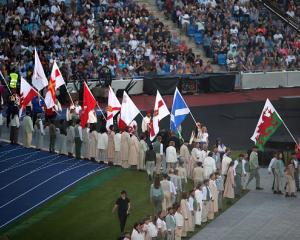
Mayor Tom Tate said the tourist city - which hosted the Games in 2018 - could again hold the event in 2026 after Victoria sensationally cancelled this week.
But it would only be possible if the federal government redirects funding.
"Do we want to help? Is the question," Mr Tate told reporters on Thursday.
"The answer is yes, and we can if the federal government is willing to re-provision (the funding)."
Mr Tate launched the last-minute rescue bid two days after his deputy Donna Gates poured cold water on the idea and Premier Annastacia Palaszczuk ruled out any possibility Queensland would step in to rescue the sporting event.
Perth Mayor Basil Zempilas has made a similar pitch for the Games, but none of the other premiers or chief ministers are interested in hosting duties.
The successful 2018 Gold Coast Commonwealth Games cost $A1.2 billion to host and the infrastructure remains in place.
"Remember, I'm not asking for more money," Mr Tate said.
"I'm just asking for the money to be re-provisioned that they were going to spend in 2026.
"Instead of spending it in Victoria, spend it here in southeast Queensland."
Victoria dumped hosting the 2026 Games this week over a forecast cost blowout of up to $4.4 billion in just over a year since it was budgeted at $2.6b.
A report has revealed a task force set up in 2017 to explore a regional bid for the Games in 2030 shifted to targeting a tilt for 2034 and beyond as it considered the timing most appropriate.
The pre-feasibility study, funded by the Victorian government and regional councils, flagged a litany of issues across venues, housing, staffing, transport and ticketing stemming from hosting the global event across several regional cities.
"Spreading venues across Geelong, Ballarat, Bendigo and Shepparton regions would require athletes to travel regularly in excess of the 60 minutes," reads a 30-page summary of the report, published by The Australian.
Its authors Otium Planning Group warned housing more than 40 percent of athletes outside of the main village could add costs through duplicating accommodation for athletes and officials, as well as transport services.
One of the options floated for the main athletes' village was mooring a cruise ship off the Port of Geelong as some liners are able to accommodate up to 3500 beds.
Sports venue requirements for the Games could also force the use of temporary infrastructure and "somewhat diminish" the legacy benefits for regional host cities, it said.
Victorian Housing Minister Colin Brooks refused to be drawn on the study's findings, citing ongoing contract termination talks with government representatives and Commonwealth Games leaders in London.
Victoria was awarded the 2026 Games in April 2022 after a raft of Australian states and countries ruled out making a bid.
No money was set aside in the May federal budget for the Games but Prime Minister Anthony Albanese categorically denied it was a sign his government knew the event was going to be scrapped.
"It's nonsense," Mr Albanese told ABC Radio.
"When it comes to announcements and engagements of different levels of government, not everything occurs ... in a budget context."
The contract backflip comes after the South African city of Durban was stripped of the 2022 event over a lack of progress in preparations, with the original 2026 host Birmingham stepping in to fill the void.
Birmingham Mayor Andy Street has urged Victoria to honour its deal, saying the UK city had shown it was possible to host the Games at a competitive price.
The last time a Commonwealth Games was completely cancelled was during World War II.











